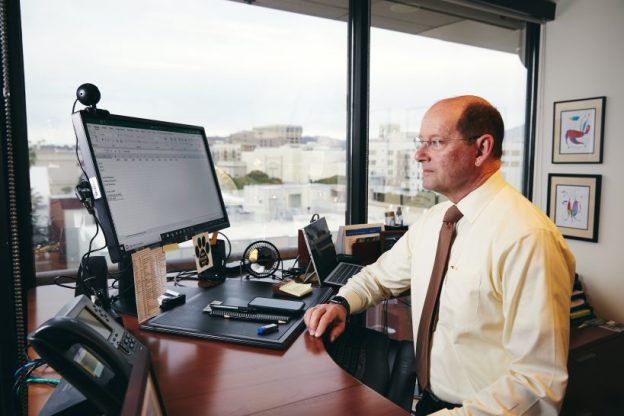
5 questions for … Dr. Steven Jacobsen
As the senior director of research for Kaiser Permanente in Southern California, Steven Jacobsen, MD, PhD, leads dedicated scientists and clinicians who use information collected during doctor and hospital visits to determine what really works — and what doesn’t work — in health care. They then use those findings to improve health and health care for Kaiser Permanente’s 12.3 million members across the country and the communities where they live.
His own research focuses on vaccine safety, kidney disease, cardiovascular disease, and men’s health.
Dr. Jacobsen is the current president-elect of the American College of Epidemiology.
Q: Why is epidemiology important to health and health care?
Epidemiology is really the art and science of observational research.
We study the factors associated with people developing a disease. Or if they have a disease, then we try to determine the factors associated with their doing very well or not doing well at all.
In clinical trials, experiments are done under very tightly controlled circumstances with select individuals. In epidemiology, we determine what’s going on in the real world and try to make sense of all the factors influencing the outcomes.
Q: What led you to focus on men’s health?
I was at Mayo Clinic in Minnesota hoping to do pediatric epidemiology. I quickly learned that more than half of the children born in the city of Rochester (where Mayo Clinic is located) didn’t stay there more than a few years because they were born to residents and fellows at the clinic who moved on. It was hard to look at long-term outcomes for these kids.
I took over a study on the natural history and progression of lower urinary tract symptoms in men. The study combined data from a questionnaire and medical records for over 2,000 men. Clearly, it was an area in which I could make a difference, so I switched from pediatrics to men’s health — pure serendipity.
This study went on for 20 years and did much to inform the medical community about many aspects of men’s health. It provided background information to help interpret changes in symptom severity for lower urinary tract symptoms. It provided information about the co-occurrence of conditions affecting men’s health such as prostatitis, erectile dysfunction, and coronary heart disease.
It also helped us understand more about screening tests for prostate cancer, how well they work, and who chooses to be screened. In all, there were more than 100 publications that emanated from that study.
Q: Can you tell us more about ongoing prostate cancer research you are involved in?
In one study we’re trying to understand the variability in care of men newly diagnosed with low-stage/low-grade prostate cancer who opt not to immediately pursue treatment such as surgery or radiation therapy. There is a lot of concern about the side effects of these treatments and we need to develop a way to better understand patterns of follow-up treatment, such as how often prostate-specific antigen or PSA is measured, how often the cancer is rebiopsied, and how often men return for office visits. Armed with this information, we can develop ways to better tailor prostate cancer follow-up care, with the ultimate aim of developing a standardized approach to care based on each man’s stated goals.
Q: What led to your current role?
I dropped out of college to become a McDonald’s manager. Then, I trained as a carpenter. Soon I realized I wanted to make a broader contribution and returned to college to finish up my undergraduate degree with the goal of going into medicine and becoming a family medicine physician.
In my first year of medical school, I had a course in biostatistics, and I was intrigued. So, I took a break and got my master’s degree in biostatistics, then a PhD in epidemiology.
After a 4-year break, I returned to medical school. My first clinical rotation was in trauma surgery at a Milwaukee county hospital. I enjoyed working with patients, but ultimately I took a full-time research position at Mayo Clinic and gave up clinical medicine.
In that role, I was writing papers and hoping someone would do something with the findings. Then the position opened at Kaiser Permanente in Southern California. My work here enables me to work with talented colleagues to make sure we are answering important clinical questions that directly affect clinical care and then take steps to ensure the findings are acted upon.
I’ve been here 13 years now.
Q: What do you enjoy in your free time?
I like hiking and being out in nature and working with my hands. I’m using my carpentry skills to remodel a cabin my wife, Bonnie Edwards, and I have in the mountains. Every year, we make a trip to Scotland, where we were married. We’ve been on hikes on miles-long stretches of beach there and not seen another person, just white sand and blue water. Amazingly beautiful!





